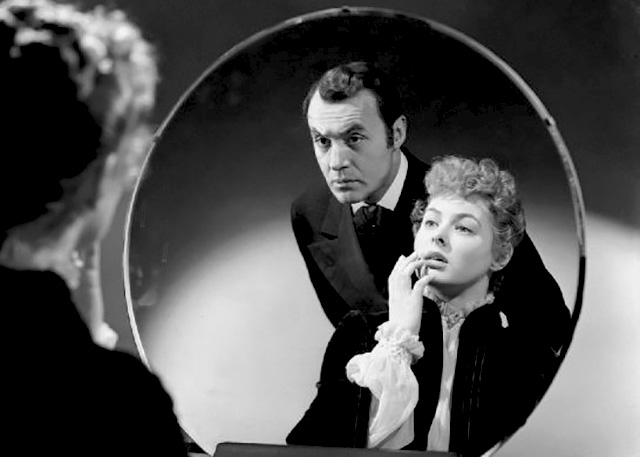Gaslight (1944)

Gaslight opens in Victorian-era London, with the death of acclaimed opera diva Alice Alquist, who had been strangled by someone trying to heist her jewels, and who still looms at large. The scene shifts to Italy, where her niece Paula Alquist (Bergman, Casablanca), also a singer, is taking singing lessons which get progressively worse as she loses her passion for the pieces and increases her passion with the pianist, Gregory Anton (Boyer, Barefoot in the Park). The two lovebirds marry after only knowing each other weeks, and they return to the home in Thornton Square, London, that she inherited after her aunt’s untimely death. Not long after settling in, Gregory begins accusing Paula of being forgetful, and of doing things she isn’t aware of, and though, at first, she feels this could not be the case, he presents her with evidence time and again, causing even Paula begins to agree that she truly is going mad. She is forbidden from leaving the home or having guests over, and when she begins to hear footsteps in the closed-off attic up above, and the gaslight dims, but she shrugs them off as more signs of losing her mind. Brian Cameron (Cotten, Shadow of a Doubt), a very perceptive Scotland Yard inspector, suspects there may be more to this couple than meets the eye, and begins to sniff around the place in order to find out just what’s going on.
Ingrid Bergman’s performance is the highlight of the film, which would earn her the first of her three Oscars for Best Actress. It would be one of seven Academy Awards the film would be nominated for, including a supporting nod to Angela Lansbury (The Manchurian Candidate, Nanny McPhee), in her very first film performance at 17 years old, as one of the tarty housemaids. Bergman is able to maintain a growing vulnerability and insecurity without seeming like a complete ditz in the process, which is important to maintain not only audience sympathy but to drum up certain anger at Gregory for his sheer cruelty in how he is manipulating her for his own devices. Although the film, for most of its run time, doesn’t overtly give away that the husband is playing his wife for a fool, very few audiences watching Gaslight today will be so clueless as to think that Gregory doesn’t have something up his proverbial sleeve. If you’re someone who expects a good mystery, you’ll likely be disappointed, as the casting alone is enough to tell you just who is good and who is the villain. Cast an all-American Hollywood leading man in the Boyer role and we’d have a much different sort of movie.
Director George Cukor (My Fair Lady, The Philadelphia Story) delivers quite a good atmosphere working in the psychological melodrama genre, something he isn’t necessarily known for. It had only been four years since the British version of the source 1938 Patrick Hamilton play, “Angel Street”, had been filmed and released, also with the title of Gaslight. To counteract this, MGM secured the rights to the previous version and tried (albeit unsuccessfully) to destroy all the prints. Interestingly, some video releases package together both versions of the film, and many critics prefer the original, despite the high production values of its remake. The 1944 version is a very glossy, high-quality Hollywood production, and while it doesn’t deliver on the psychological suspense of such things as Hitchcock’s similar work for David O. Selznick, like Rebecca and Suspicion, it is still quite a well-told tale, perhaps more interesting because we know where it is going and can feel just how cruel and despicable an avaricious person can be.
Qwipster’s rating: A+
MPAA Rated: Not rated, but probably PG for thematic material
Length: 114 min.
Cast: Ingrid Bergman, Charles Boyer, Joseph Cotten, Angela Lansbury, Dame May Whitty, Barbara Everest
Director: George Cukor
Screenplay: John Van Druten, Walter Reisch, John L. Balderston (based on the play, “Angel Street”, by Patrick Hamilton)
